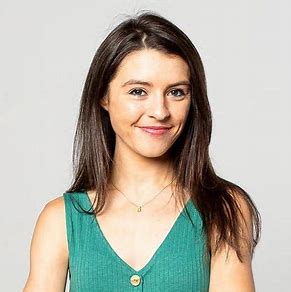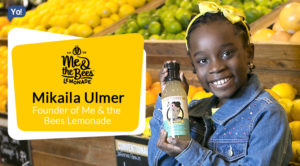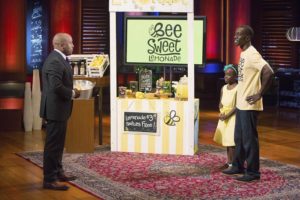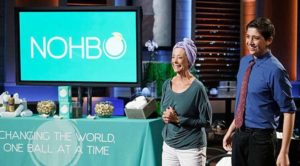Aaron Krause pitched his company, Scrub Daddy, on Shark Tank in 2012. His product is argued as the most successful product to have ever been pitched on Shark Tank. In addition to the wonderful creativity of his product, Aaron’s pitch was extremely thought-through and concise, drawing interest from most if not all of the Sharks. Scrub Daddy is essentially a sponge that is shaped like a smiling face. However, behind the simplicity of its look, the Scrub Daddy uses a technology that changes the sponge’s texture based on the temperature of the water, making it easier to use depending on the cleaning task. Also, the smiling face style of the sponge allows users to handily clean inside tight spaces such as cups, vases, and more. After his successful pitch to the Sharks, Aaron was able to agree on a deal with Lori, granting her 20% equity in his company in exchange for $200,000. To put his success into perspective, Lori has made at least $20 million from her $200,000 investment in Scrub Daddy since 2012. The company itself is said to be worth around $250 million, generating over $50 million in sales since the notorious Shark Tank pitch. The story of Scrub Daddy shows the power of creativity in capturing investor attention as well as what a complex but intriguing pitch can do for investment worth.
Archive for Shark Tank – Page 2
Adelle Archer, CEO and co-founder of Eterneva, is on both the Inc and Forbes 30 Under 30 lists. In addition, Mark Cuban invested in her business when she went on Shark Tank in 2019. Eterneva is a business that Archer created after her friend and mentor Tracy Kaufman died from pancreatic cancer. The company produces diamonds out of loved ones’ ashes; Archer conceived of Eterneva because at the time, there were not many options for memorializing passed loved ones. Although cremation is at an all-time high popularity, the ashes get thrown away after about one generation. More lasting, however, would be diamonds made by Eterneva. Diamonds, Archer believed, not only allow people to mourn, but they also allow people to celebrate. I love Archer’s view that people should both mourn and celebrate. The idea is one that Christians should take to heart, as we recognize that death is not part of how the world should (and will) work, and yet hold that it is a gateway to the sweet next life with our loving Savior. Archer knows that the seven to eight month process for making the diamonds is not a drawback but a strength because it gives people time to mourn and process the death. The Eterneva team sends videos, pictures, and updates to mourning clients as they wait for the diamonds, which I believe is an innovative way to care for people. On the celebration side, the Archer counts on the diamonds to encourage people to share stories about the people who died. According to Archer, the diamonds help people to lean into the subject of death instead of turning away from it. Archer believes, and I wholly agree, that our culture hides death too much, and that communication about death is vital to caring for grieving neighbors.
I am a big fan of Sharktank, but one that caught my eye while watching the show was Nohbo. Nohbo is a company that came on shark tank in 2016 and was started by Benjamin Stern. Nohbo is a company that packages shampoo, conditioner, and soap in single-use dissolvable packages. In starting Nohbo, Benjamin’s goal was to make an impact on waste produced by plastic bottles. His product eliminates the big shampoo, conditioner, and soap bottles thrown away in every household. After getting a deal with Mark Cuban on the tank it wasn’t smooth sailing for the company. Benjamin was faced with customer complaints about damaged goods and shipping delays, but this didn’t stop him. Benjamin went back to his chemist and they came up with a better way to package the items so they didn’t get damaged in shipping but still maintained their dissolvability. This is the one thing I admire most about Benjamin, Even though he was just 16 years old he didn’t let customer complaints stop him from growing his company. He was able to change his product for the better and take another step forward.
Mark Cuban spoke up about this company after being apart of the company and spoke of his high hopes for this company. Mark thinks that this could be a 100 million dollar business in the near future. So I’m excited to see how Benjamin and Mark expand this product and the places they go.
At just 12 years old, Trey Brown started his entrepreneurial journey. Trey started by using $178 to buy shirts that he customized and sold. This purchase was the start of something much bigger for Trey.
Spergo, Trey’s company, sells customized socks, t-shirts, hoodies, and sweatpants. The company was started with the help of Sherell Peterson, Trey’s mother, who is a seamstress. She now helps run the business with Trey.
Like many businesses, the name Spergo has a meaning to Trey. He says it is a combination of sports, heroes, and go-getters. This name was crafted after Trey decided he wanted to help the kids in his community escape the violence and drugs they were surrounded with. With Spergo, Trey hopes to serve as an inspiration to the kids around him which makes his business have a great value to his community.
Trey got a $25,000 grant that helped kickstart his business to a larger scale. He was able to move from selling shirts door-to-door to a brick-and-mortar store. He then expanded to a total of three stores. Trey’s most recent endeavor was going on Shark Tank where he received $300,000 for 20% stake in his company. He hopes to expand more with this money.
Trey is an impressive young entrepreneur. He has the charisma to sell his product and get people to financially support his business endeavors. This charm will allow him to keep growing and become more successful in the future. He is also ambitious. By starting so young, he is setting himself up for a life of success in whatever adventure he chooses next. His goals are also impressive. He wants to change the future for the kids around him which makes him inspiring. At such a young age, he realizes that changes need to be made in order to provide a better future for those around him. Trey possess many key qualities that an entrepreneur needs to have to succeed and his plans for the future show he is ready to keep going.
Ultimately, Trey Brown is a great example of a young entrepreneur because he is not afraid to go out there and do the work to succeed.
Moziah Bridges grew up in a home in Tennessee, where fashion had a huge roll in his upbringing. His father used to walk around the house in suits, even when not going out in public. He was always taught to dress nice and present himself in a professional way. It was very rare that you saw a Bridges family member in a sweatshirt.
When Moziah was 9, he remembers going to the mall and seeing very overpriced, low quality bow ties. Moziah begged his mom to buy one for him, but she said that they were way too expensive. Moziah, who now goes by the name Mo, decided there to create his business, Mo’s Bows.
Mo’s grandmother was a skilled seamstress who taught him how to sew his own bows. This rocketed Mo’s interest in the fashion world. Mo’s Bows are high quality and affordable bow ties. Each and every bow is hand crafted and unique. While Mo is at school, his mother keeps the business going, and when he gets home from school, he helps her to package and ship the bowties.
The duo appeared on the hit television show, Shark Tank. While on the show, they gained the support of Daymond John who offered not only an investment but also an entrepreneurial mentorship. Starting off by selling bow ties on Etsy, Mo’s Bows are now featured on Amazon, ebay, and Mo’s personal website. Additionally, Mo has worked with the NBA becoming their personal fashion correspondent; many of Mo’s Bow’s feature the NBA logo.
Next year, Mo looks forward to graduating high school and going to college for fashion design. Mo’s story serves as an inspiration to other entrepreneurs, and he is a role model to young kids. He teaches the lesson that when there’s a passion, there’s a successful business to be unveiled. Mo’s business is something that he loves doing; so in a way, he never really works. Young entrepreneurs should take his business as a model of how they run their own businesses, find a passion and run with it.
 Garrett Gee is one of the founders of Scan Inc., a company focused on the QR code industry from a new and innovative angle. The company began out of an idea Garrett and his classmates came up with for a project in his entrepreneurship course at BYU. They decided to put their idea into action, which ended up making them millionaires. Scan is a downloadable app that allows people to make their own QR codes that can link to more than just a website. It also allows you to scan a barcode to check a price on an item. With a wider variety of codes you can scan, this company was immediately very popular to multiple large investors. The app blew up as soon as Garrett and his team launched it, and he went on Shark Tank to pitch his idea. Although he did not secure a deal with a shark, the additional publicity for his business only made it that much more popular. Garrett ended up selling Scan Inc. to Snapchat for $54 million.
Garrett Gee is one of the founders of Scan Inc., a company focused on the QR code industry from a new and innovative angle. The company began out of an idea Garrett and his classmates came up with for a project in his entrepreneurship course at BYU. They decided to put their idea into action, which ended up making them millionaires. Scan is a downloadable app that allows people to make their own QR codes that can link to more than just a website. It also allows you to scan a barcode to check a price on an item. With a wider variety of codes you can scan, this company was immediately very popular to multiple large investors. The app blew up as soon as Garrett and his team launched it, and he went on Shark Tank to pitch his idea. Although he did not secure a deal with a shark, the additional publicity for his business only made it that much more popular. Garrett ended up selling Scan Inc. to Snapchat for $54 million.
 These young and successful entrepreneurs are perfect examples of true innovators. They saw that the QR code system had more potential than it was being used for, so they decided to do something about it. Although they very well could have moved on from this idea, especially since it was an idea for their class, I am inspired by their follow through with the project. I am especially inspired by Garrett because he demonstrated his determination throughout the building of the company through his passion and drive to “connect the real world with the digital universe”.
These young and successful entrepreneurs are perfect examples of true innovators. They saw that the QR code system had more potential than it was being used for, so they decided to do something about it. Although they very well could have moved on from this idea, especially since it was an idea for their class, I am inspired by their follow through with the project. I am especially inspired by Garrett because he demonstrated his determination throughout the building of the company through his passion and drive to “connect the real world with the digital universe”.
I have learned that we have the power to “change the world from our college dorm rooms”, as Garrett said. With technology advancing, it could be any second that a million dollar idea comes to us. When approaching innovation, it is important not to limit yourself by self doubt because the world truly is at our fingertips.
Ben Stern was a freshman in high school when he was taking biology. The topic of recycling came up and Stern began to turn his entrepreneurial wheels. At the age of 16, Stern had brainstormed a single-use shampoo ball. This idea was spurred from the thought that “the furthest room away from the recycling bin was the bathroom”. He saw his mom disposing of a tide pod and wanted to eliminate as much waste as possible. The Nohbo Ball was pitched on Shark Tank in front of billionaire investors in 2016. Stern eventually landed a deal with Mark Cuban, who secured an investment of $100,000 for 25% stake in the company. Thanks to the help of Cuban and his own entrepreneurial drive, Stern now has purchasing agreements in Europe for 76 million units. An idea that started in a high school classroom has turned into over three million in further investments.
Stern claims that his innovation is not without obstacles, however. Starting a company from scratch can seem like an insurmountable task, especially for a teenager with no practical business-world experience. Product development was seen as very challenging to begin. The chemistry for the product had to be redesigned due to the powder-based product breaking up. Stern has since pivoted to a liquid drop-based design that is more effective. Stern partnered with Absolutely Natural, a manufacturing cosmetics company, and has been able to scale production, seeing that the Nohbo Ball produces 180 million drops per year.
This story is not only inspiring to me nut also extremely relevant. Stern took a simple problem based on relevant information that he was learning in the classroom and implemented it in his own entrepreneurial sense. The product was not only innovative, as it adapted towards today’s climate of ecofriendly products and sustainability, but Stern faced many obstacles along the way. Stern did not have a straight path to success, but he had to entirely redesign his product to see that it fully worked and could continue to be scaled.
For more about Stern’s story, click here.
Urns, caskets, and funeral homes—they all felt uninspiring and morose to Adelle Archer, especially after she lost her close friend and mentor to pancreatic cancer in 2015. Although cremation rates are skyrocketing (over 50% of the US chooses to cremate their loved ones), the ashes are usually thrown out after a generation. From the ashes of her own grieving process, Archer created Eterneva, a company that honors the lives of pets and people by turning their cremated ashes into diamonds.
skyrocketing (over 50% of the US chooses to cremate their loved ones), the ashes are usually thrown out after a generation. From the ashes of her own grieving process, Archer created Eterneva, a company that honors the lives of pets and people by turning their cremated ashes into diamonds.
In layman’s terms, Eterneva uses the carbon content found within cremated remains to create a diamond. Interestingly, there is more than enough carbon to grow a diamond from human remains. Typical human remains contain approximately 1-4% of carbon, which yields about 2.5 to 8.5 mg of carbon. This is more than enough for Eterneva, which only needs about 1 gram of carbon for the diamond-making process!
Prior to founding Eterneva, Archer received her MBA in Entrepreneurship at the Acton School of Business, graduating as valedictorian of her class at twenty-three.
Since then, Archer appeared on “Shark Tank”, receiving an investment from Mark Cuban; she has also been featured on Forbes “30 under 30” list.
Perhaps the greatest legacy of Eterneva, however, is their efforts in reducing the stigma that surrounds grief. Too often, those in the grieving process feel misunderstood and isolated due to the lack of conversation surrounding the grieving process in society. With each diamond, Eterneva bridges the emotional void of pain and celebration for those left behind.
Eric Bandholz worked as a financial advisor in Washington state, but the company Eric worked for had a “no facial hair” policy that he was not a fan of, so he left the company to start a beard grooming company. He attended a Startup Weekend event where he met Lindsey Reinders and Jeremy McGee, who would go on to help Eric form the company Beardbrand. Beardbrand sells a variety of beard care products including beard oil and mustache wax. Initially the three of them started with $8,000 and they had to reinvest any profits they earned back into the company for their first 10 months. Beardbrand launched its online store and put a lot of resources towards marketing on online platforms which helped the company to grow. Particularly important is the companies YouTube channel which has over 1,000,000 subscribers and has been essential in helping the company to grow. Eric appeared on ABC’s Shark Tank and although he did not receive any investment money the publicity gained from appearing on the show helped to raise awareness about Beardbrand and increase sales.

Seeing that Eric left the safety of his job to pursue something that he’s passionate about is very encouraging. I think Eric is a great example of an entrepreneur taking something that they love and making it into a business.
How many of you when you were young would create lemonade stands with your siblings or friends in the heat of summer? How many of you would make signs, set up tables, and make refreshing lemonade to quench the thirst of people and to make some extra spending money? In neighborhoods still today, children will sell iced cold lemonade to anyone who passes by for about $0.50 a cup. As a child did you ever think that you would run a successful lemonade business that sold lemonade worldwide? Have you ever thought that you could be the CEO of a start up business? Well, let me introduce you to someone who did. Her name is Mikaila Ulmer.  Let me share her story. At age 4 she was stung by two bees within a week span. This made her scared of them, but fascinated by them. So, she began learning about them and discovered how important they are to our world, so she wanted to help them. Her great grandma sent her and her family a homemade recipe book and in it was her famous flaxseed lemonade, so Mikaila began selling her great grandma’s famous lemonade recipe to the neighbors in her hometown in Austin. Mikaila’s family at the time encouraged her to begin brainstorming product ideas to promote at the Acton Children’s Business Fair and Austin Lemonade Day. As she began to think, she wanted to incorporate bees into her product. She decided to mix helping bees with her great grandmas lemonade. So, she created lemonade that used honeybee’s honey instead of sugar, and some of the proceeds were donated to foundations who sought to save the bees. Mikaila would proudly declare, “Buy a Bottle…Save a Bee.” Then Mikaila had the opportunity to go on Shark Tank, and she struck a deal with Daymond John when she was only 11 years old. One is never too young to create and succeed.
Let me share her story. At age 4 she was stung by two bees within a week span. This made her scared of them, but fascinated by them. So, she began learning about them and discovered how important they are to our world, so she wanted to help them. Her great grandma sent her and her family a homemade recipe book and in it was her famous flaxseed lemonade, so Mikaila began selling her great grandma’s famous lemonade recipe to the neighbors in her hometown in Austin. Mikaila’s family at the time encouraged her to begin brainstorming product ideas to promote at the Acton Children’s Business Fair and Austin Lemonade Day. As she began to think, she wanted to incorporate bees into her product. She decided to mix helping bees with her great grandmas lemonade. So, she created lemonade that used honeybee’s honey instead of sugar, and some of the proceeds were donated to foundations who sought to save the bees. Mikaila would proudly declare, “Buy a Bottle…Save a Bee.” Then Mikaila had the opportunity to go on Shark Tank, and she struck a deal with Daymond John when she was only 11 years old. One is never too young to create and succeed. 
Mikaila Ulmer who is now 15 years old has struck success in the Lemonade business, by selling her product called, Me & the Bees Lemonade. Her 5 different flavors are available at Whole Foods Market, The Fresh Market, World Market, H-E-B stores across Texas and Kroger stores in Houston as well as some restaurants and food trucks. Her story and more information can be found here: https://www.meandthebees.com/pages/about-us
You can find Mikaila and follow her progress and success on Facebook: https://www.facebook.com/MikailasBees or on Instagram:https://www.instagram.com/mikailasbees/?hl=en It is so inspiring and exciting to witness young entrepreneurs find passion for something and pursue it and achieve it, and Mikaila Ulmer has definitely excelled in all of these areas.
Copyright © 2025 All Rights Reserved

